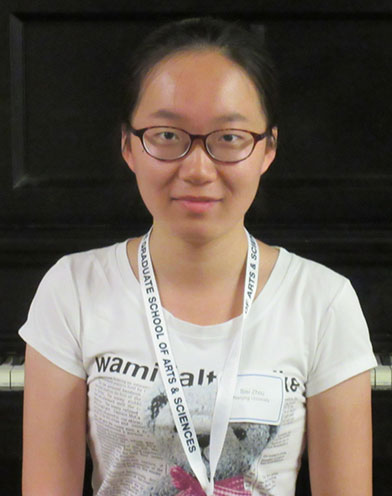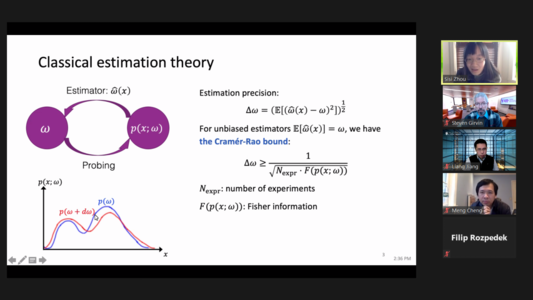
On March 1, 2021, Sisi Zhou successfully defended her thesis, “Error-corrected quantum metrology” (Advisor: Liang Jiang).
Zhou explained, “Modern quantum technologies have the potential to revolutionize our daily lives including our ways to transmit messages, process information and detect signals. Skepticism was raised along with the rapid development because quantum systems are fragile to environmental noise and it is a critical issue how to overcome unavoidable interactions with environment. We consider quantum error correction, a standard tool to combat noise in quantum information science, in the context of quantum sensing. To be specific, we study the behavior of quantum sensors under environmental noise and identify the sensing limits of noisy quantum sensors. Surprisingly, the sensing limits are achievable using novel quantum error correction protocols which balance the trade-off between the sensitivity enhancement and the noise reduction. Our work focuses on the theoretical interface between quantum error correction and quantum sensing, but also provide fundamental guidance for manufacturing of modern quantum sensors.”
Zhou will be an IQIM Postdoctoral Scholar at the California Institute of Technology.
Thesis Abstract: Quantum metrology, which studies parameter estimation in quantum systems, has many applications in science and technology ranging from frequency spectroscopy to gravitational wave detection. Quantum mechanics imposes a fundamental limit on the estimation precision, called the Heisenberg limit (HL), which bears a quadratic enhancement over the standard quantum limit (SQL) determined by classical statistics. The HL is achievable in ideal quantum devices, but is not always achievable in presence of noise.
Quantum error correction (QEC), as a standard tool in quantum information science to combat the effect of noise, was considered as a candidate to enhance quantum metrology in noisy environment. This thesis studies metrological limits in noisy quantum systems and proposes QEC protocols to achieve these limits. First, we consider Hamiltonian estimation in Markovian master equations and obtain a necessary and sufficient condition called the “Hamiltonian-not-in-Lindblad-span” condition to achieve the HL. When it holds, we provide ancilla-assisted QEC protocols achieving the HL; when it fails, the SQL is inevitable even using arbitrary quantum controls, but approximate QEC protocols can achieve the optimal SQL coefficient. We generalize the results to parameter estimation in quantum channels, where we obtain the “Hamiltonian-not-in-Kraus-spa” condition and find single-letter formulas for asymptotic estimation precision by showing attainability of previously established bounds using QEC protocols. All QEC protocols are optimized via semidefinite programming. Finally, we show that reversely, metrological bounds also restrict the performance of error-correcting codes by deriving a powerful bound in covariant QEC.

